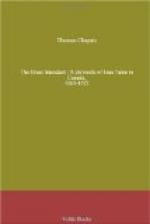As a matter of fact [he said], receiving the petitions for entering lawsuits does not mean retaining them before myself. I have not judged twenty cases, civil or criminal, since I came here, having always tried as much as I could to conciliate the opposing parties. The reason why I speak now of this matter is that very often, for twenty or thirty livres of principal, a plaintiff goes before the judge of first instance—which diverts the parties from the proper cultivation of their farms—and later on, by way of an appeal, before the Sovereign Council which likes to hear and judge cases.
Colbert did not deem the decision of the council advisable.
It is contrary [he wrote] to the order of justice, in virtue of which, leaving in their own sphere the superior judges, the judges of first instance are empowered to hear all cases within their jurisdiction, and their judgments can be appealed from to the Sovereign Council. Moreover it would be a burden for the king’s subjects living far from Quebec to go there unnecessarily in order to ascertain before what tribunal they should be heard.
We must now speak of a most important matter—the brandy traffic. The sale of intoxicating liquor to the Indians had always been prohibited in the colony. In 1657 a decree of the King’s State Council had ratified and renewed this prohibition under pain of corporal punishment. Yet, notwithstanding the decree, greedy traders broke the law and, for the purpose of getting furs at a low price, supplied the Indians with eau-de-feu, or firewater, which made them like wild beasts. The most frightful disorders were prevalent, the most heinous crimes committed, and scandalous demoralization followed. In 1660 the evil was so great that Mgr de Laval, exercising his pastoral functions, decreed excommunication against all those pursuing the brandy traffic in defiance of ordinances. This might have stopped the progress of the evil had not the governor Avaugour opened the door to renewed disorder two years later by a most




